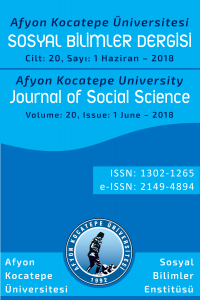Öz
The prolific English detective and crime fiction
writer Agatha Christie’s A Caribbean Mystery (1964) has an outstanding status
due to the number of controversies involved in the plotline, the complicated
relationships between characters and the exotic setting in a supposedly
colonial background. Moreover, the novel draws attention due to the tension
that keeps rising until the end in addition to the fearful environment. In
fact, the psychological response of the characters in the novel is worth
studying due to the sense of uncanny. Apparently, only Miss Marple is capable
of achieving the rationalising process that includes the familiar and the
strange. The psychological understanding of the uncanny seems to be highly
related to the fictional account in Christie’s novel. Therefore, this work aims
to analyse Christie’s A Caribbean Mystery in the light of the sense of the
uncanny to explain the response of the characters.
Anahtar Kelimeler
Agatha Christie A Caribbean Mystery Uncanny Sigmund Freud Detective Fiction
Kaynakça
- Baghban, M. 1990. The Making of Two Readers: Agatha Christie and Jack London, The Reading Teacher, 44 (1), 42-46. JSTOR. 2 Mar. 2017.
- Bernstein, S. 2003. It Walks: The Ambulatory Uncanny, MLN, 118 (5), 1111-1139. JSTOR. 13 Feb. 2017.
- Brown, R. 2007. The Uncanny English House in the English Novel: 1880s to 1930s, University of Florida, Diss. Ann Arbor: ProQuest/UMI. (Publication No. 3311619). 18 Feb. 2017.
- Chia-ying, W. 2007. The Importance of Being Cosy: Agatha Christie and Golden Age British Detective Fiction, The State University of New York, Diss. Ann Arbor: ProQuest/UMI. (Publication No. 3291537). 18 Feb. 2017.
- Christie, A. 1964. A Caribbean Mystery. London: Penguin.
- Freud, Sigmund. 2003. The Uncanny. Trans. David McLintock, London: Penguin.
- Gerald, M. C. 1992. Agatha Christie’s Drugs and Disease, Pharmacy in History, 34 (2), 95-107. JSTOR. 2 Mar. 2017.
- Kimball, S. 1987. Uncanny Narration in Moby-Dick, American Literature, 59 (4), 528-547. JSTOR. 14 Feb. 2017.
- Portier, F. 2013. The Uncanny Genre of the Modern Novel, University of Wisconsin, Diss. Ann Arbor: ProQuest/UMI. (Publication No. 3598591). 11 Feb. 2017.
- Seymour, M. D. 2006. The Uncanny as ‘Home’: Doris Lessing, Toni Morrison, Keri Hulme and Sheri Reynolds, The University of Tulsa, Diss. Ann Arbor: ProQuest/UMI. (Publication No. 3209621). 11 Feb. 2017.
- Towell, L. C. 2009. The Uncanny and Domesticity in the stories of Arthur Conan Doyle, 1883-1903, University of Tulsa, Diss. Ann Arbor: ProQuest/UMI. (Publication No. 3392885). 11 Feb. 2017.
Öz
İngiliz
polisiye roman yazarı Agatha Christie’nin Türkçeye 2010 yılında Ölüm Adası
olarak çevrilen A Caribbean Mystery (1964) romanı olay örgüsündeki karmaşık
durumlar, karakterler arasındaki çekişmeler ve sömürgecilik geçmişiyle
bağlantılı egzotik bir yerde geçmesi bakımından farklı bir konuma sahiptir.
Ayrıca bu eser, korkutucu bir çevrede geçmenin yanı sıra romanın sonuna kadar
artmaya devam eden gerilim sebebiyle de dikkat çeker. Özüne bakılacak olursa,
bu romandaki karakterlerin psikolojik tepkileri olay örgüsüne hâkim olan ve
Sigmund Freud’un ortaya attığı tekinsizlik duygusu nedeniyle incelenmelidir.
Görünüşe bakıldığında, yalnızca Miss Marple bu mantıklı açıklama sürecini
başarıyla yürütebilmekte ve tekinsizlik duygusunu açıklamaya çalışmaktadır.
Dolayısıyla, tekinsizlik duygusunun psikolojideki etkileri Christie’nin
eserindeki kurgusal durumla son derece ilgilidir. Bu nedenle, bu makale
Christie’nin Ölüm Adası (A Caribbean Mystery) eserini Freud’un tekinsizlik
kavramı ışığında incelemeyi ve karakterlerin verdikleri tepkileri açıklamayı
amaçlamaktadır.
Anahtar Kelimeler
Agatha Christie Ölüm Adası Tekinsizlik Sigmund Freud Polisiye Roman
Kaynakça
- Baghban, M. 1990. The Making of Two Readers: Agatha Christie and Jack London, The Reading Teacher, 44 (1), 42-46. JSTOR. 2 Mar. 2017.
- Bernstein, S. 2003. It Walks: The Ambulatory Uncanny, MLN, 118 (5), 1111-1139. JSTOR. 13 Feb. 2017.
- Brown, R. 2007. The Uncanny English House in the English Novel: 1880s to 1930s, University of Florida, Diss. Ann Arbor: ProQuest/UMI. (Publication No. 3311619). 18 Feb. 2017.
- Chia-ying, W. 2007. The Importance of Being Cosy: Agatha Christie and Golden Age British Detective Fiction, The State University of New York, Diss. Ann Arbor: ProQuest/UMI. (Publication No. 3291537). 18 Feb. 2017.
- Christie, A. 1964. A Caribbean Mystery. London: Penguin.
- Freud, Sigmund. 2003. The Uncanny. Trans. David McLintock, London: Penguin.
- Gerald, M. C. 1992. Agatha Christie’s Drugs and Disease, Pharmacy in History, 34 (2), 95-107. JSTOR. 2 Mar. 2017.
- Kimball, S. 1987. Uncanny Narration in Moby-Dick, American Literature, 59 (4), 528-547. JSTOR. 14 Feb. 2017.
- Portier, F. 2013. The Uncanny Genre of the Modern Novel, University of Wisconsin, Diss. Ann Arbor: ProQuest/UMI. (Publication No. 3598591). 11 Feb. 2017.
- Seymour, M. D. 2006. The Uncanny as ‘Home’: Doris Lessing, Toni Morrison, Keri Hulme and Sheri Reynolds, The University of Tulsa, Diss. Ann Arbor: ProQuest/UMI. (Publication No. 3209621). 11 Feb. 2017.
- Towell, L. C. 2009. The Uncanny and Domesticity in the stories of Arthur Conan Doyle, 1883-1903, University of Tulsa, Diss. Ann Arbor: ProQuest/UMI. (Publication No. 3392885). 11 Feb. 2017.
Ayrıntılar
| Birincil Dil | İngilizce |
|---|---|
| Bölüm | Araştırma Makalesi |
| Yazarlar | |
| Yayımlanma Tarihi | 22 Haziran 2018 |
| Gönderilme Tarihi | 17 Nisan 2017 |
| Yayımlandığı Sayı | Yıl 2018 Cilt: 20 Sayı: 1 |

This work is licensed under a Creative Commons Attribution-NonCommercial-NoDerivatives 4.0 International License.

